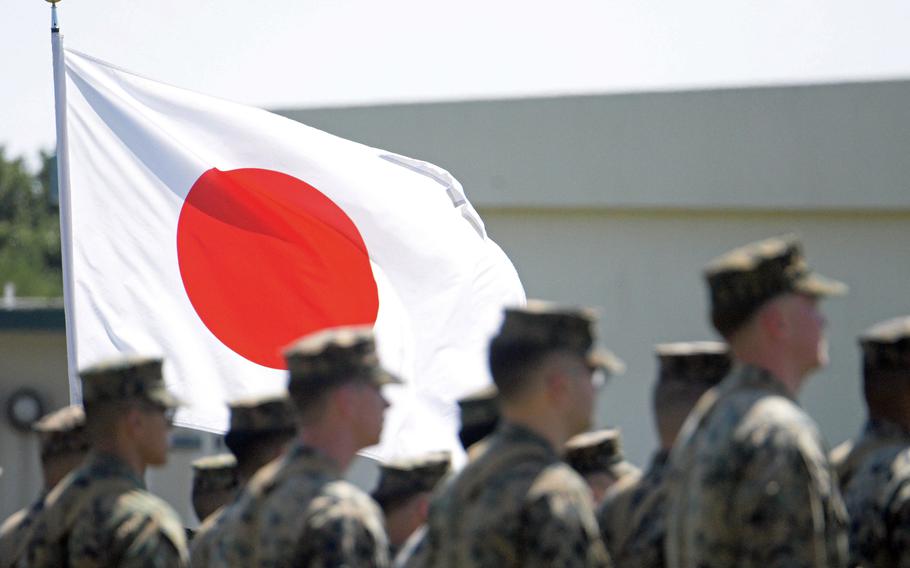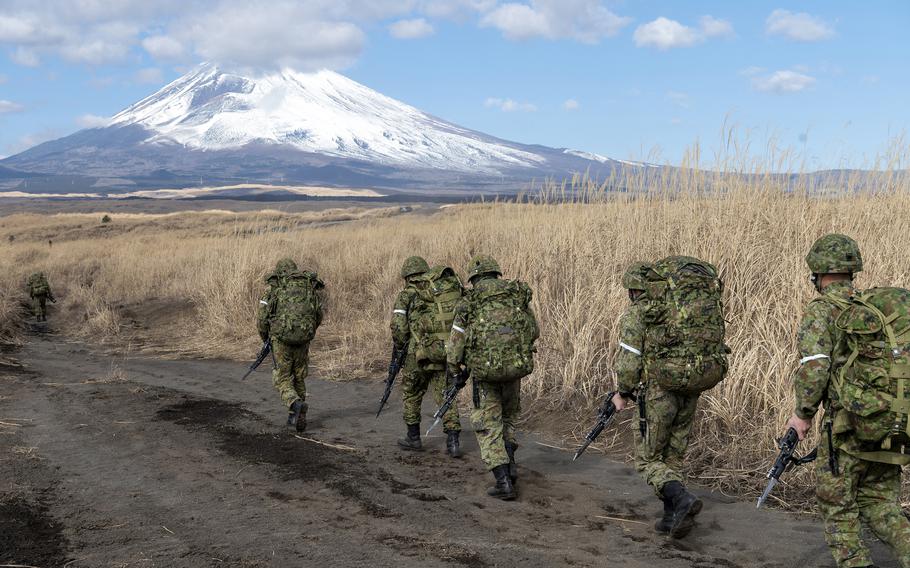
Japan's national flag flaps in the wind during a Marine Corps ceremony at Camp Courtney, Okinawa, Tuesday, March 7, 2023. (Frank Andrews/Stars and Stripes)
TOKYO — Four out of five Japanese people polled by Japan’s government about their nation’s military worry the country could go to war.
Of 1,600 people over age 18 who responded to the mail-in poll, 86.2% saw a danger of Japan being attacked or getting involved in a conflict, according to results released by Japan’s Cabinet Office on Tuesday. The office conducted the poll between Nov. 17 and Dec. 25. It did not ask respondents to predict when a conflict would take place.
The last poll four years ago found 85.5% saw a risk of war, according to the Cabinet Office website.
The Japanese public’s heightened concern follows Russia’s invasion of Ukraine, a massive Chinese military buildup and record-breaking number of North Korean missile launches last year.
The survey reflects the increasingly severe security environment surrounding Japan, a spokesperson for the Ministry of Defense said in an email Wednesday. Japanese government officials often speak to the press on condition of anonymity.
“We will use the result as reference and take necessary measures to secure peace and security of our country and the safety of the Japanese citizens in order to meet their expectations appropriately,” the spokesperson said.
Respondents cited international tensions (85.7%) as the primary cause of their fears; a poorly functioning United Nations (38.2%); and Japan lacking sufficient defenses (28.2%).
A strong majority, 89.7%, said the U.S.-Japan security treaty helps Japan, versus 9.1% who said it doesn’t help. In 2018, 77.5% said it helps and 15.6% said it didn’t help.

Japan Ground Self-Defense Force paratroopers assigned to the 1st Airborne Brigade maneuver near Mount Fuji, Jan. 31, 2023. (Yasuo Osakabe/U.S. Air Force)
The top five defense issues cited most often included nuclear weapon and missile development by North Korea (68.9%); Japan’s defense capabilities and posture (64%); modernization of China’s military and its activities in areas surrounding Japan and the East and South China Seas (61.3%); and Russia’s invasion of Ukraine (52.1%).
Respondents placed less emphasis on Russia’s military development and activities in areas surrounding Japan (37.6%); the U.S. military’s posture in areas surrounding Japan (30.4%); arms control and disarmament (23.9%); information warfare (22.5%); and activities in space and cyberspace (20.2%).
Fewer respondents (53%) were satisfied with Japan’s military capability last year than four years ago (60.1%).
Those who thought Japan should enhance its defense capability increased to 41.5% from 29.1% in 2018. Only 3.6% said Japan’s defense power should be reduced, down from 4.5% in the previous poll.
The survey coincided with a commitment by Japan’s government to double military spending and acquire the capability to strike targets in enemy territory.
Meanwhile, Chinese Foreign Minister Qin Gang warned Japan on Tuesday to reject a "new Cold War" led by America to pressure Beijing, according to a press conference readout posted by China’s Ministry of Foreign Affairs.
"Should some people from the Japanese side choose the beggar-thy-neighbor approach rather than a friendly partnership and take part in a new Cold War to contain China, bilateral relations will only suffer new wounds when the old ones are yet to be healed," Qin told reporters in Beijing.
America is seeking "hegemony" and "camp-based confrontation," and is trying to contain China, added the former ambassador to the U.S. who took over as foreign minister in December.
China will "continue to pursue peaceful reunification" with Taiwan but retains "the option of taking all necessary measures," he said.
No nation, including the U.S., has the right to interfere in Taiwan affairs, he said.
The Taiwan issue is "the first red line that cannot be crossed in Sino-U.S. relations," Qin said.